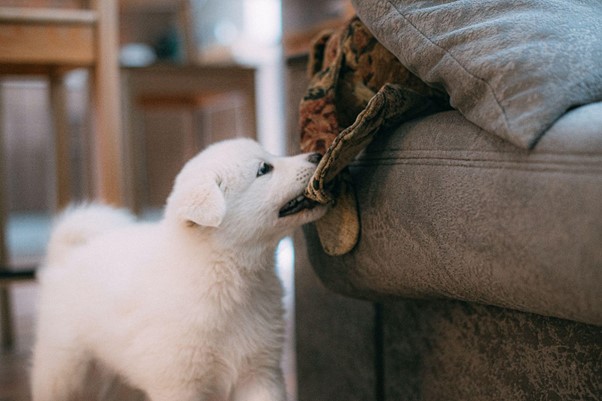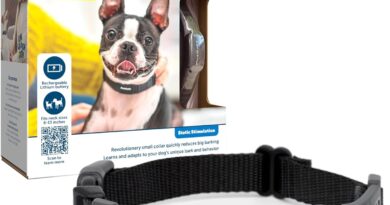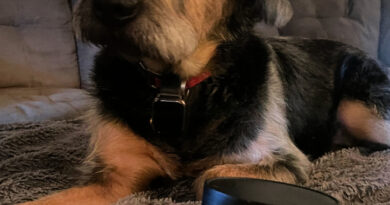How To Stop Your Puppy Destroying Your Home
Many first-time puppy owners underestimate the mess and destruction that a puppy can create. From tearing apart sofa cushions to pooping all over the carpet, puppies can get up to all kinds of trouble if you don’t take precautions. Whether you’ve recently adopted a puppy or are thinking of adopting a puppy, here are some of the steps you can take to prevent your new furry family member from destroying your home.
Understand why puppies have destructive tendencies
Puppies can exhibit destructive behavior for a variety of reasons. By understanding their motives, you can more easily discourage them from destroying your stuff. Some of the reasons puppies destroy things include:
- Wild instincts: Dogs may have been domesticated for centuries, but they’re still born with a wild mindset. This includes going to the toilet where they see fit and tearing apart things as part of their hunting instinct. Training is essential for getting rid of these wild instincts.
- Boredom: Like kids, puppies want to constantly play. If they don’t have enough stimulation, they will find things to play with – which usually involves chewing things out of curiosity.
- Lack of exercise: Puppies need exercise in order to burn off energy. If you do not play with them and eventually start walking them once they are vaccinated, they will find their own ways to burn off energy.
- Anxiety: Loneliness and lack of familiarity can cause many puppies to get anxious. Many puppies experience stress when separated from their mother and then further stress when their owner is not around. Behaviours like digging and chewing can often be a form of anxiety-relief.
- Teething: A puppy should already have their baby teeth by the time you adopt them, however their baby teeth will fall out at around 4 to 6 months. During this time, many puppies will chew a lot in order to reduce the discomfort of the new teeth coming through.
Once you know why your puppy is being destructive, you can identify the best way of reducing this destructive behaviour. A few general things you can do to stop your puppy destroying your home are included below.
Avoid leaving your puppy alone for long periods
Anxiety and boredom are more likely to set in when your puppy is alone – which will likely lead to chewing. By being at home as much as possible in the first few weeks, you can reduce anxiety and boredom and reduce destructive behavior.
Being at home also allows you to monitor your pup so that you can intervene if they start chewing something or doing their business on the carpet – allowing you to reduce the potential damage. Monitoring your puppy is also important for making sure that they don’t get their teeth on anything that could be dangerous to chew or swallow.
While you can keep puppies locked up in a crate or small puppy-proofed room for short periods to prevent destruction, it’s not fair to leave them locked up for long periods of time. Try to arrange to work from home or get family members/friends to dog-sit so that your puppy is left alone as little as possible. Ideally puppies should not be left alone for more than two hours.
Provide an outlet with chew toys
Chewing is one of the most frustrating destructive tendencies that puppies exhibit. You cannot really stop a puppy’s urge to chew – their mouth is their way of interacting with the world and to take this away is essentially like telling a child they cannot touch anything.
This is why it’s important to provide toys for your puppy. This gives your puppy something that they can chew to release their frustration and boredom instead of taking it out on your TV remote or rug.
Puppies may still get bored of just one of two toys, so it’s worth buying a range of toys for them. A good way to keep puppies interested in toys is to circulate them – this involves giving them some toys and hiding the others before eventually swapping them around so that toys feel new again.
It could be worth investing in some robust toys that won’t be torn apart in seconds – you can find such toys online. If you don’t want to spend too much money on toys, you can always find ways to make your own toys. Just be careful of giving your puppy an old slipper or a sock, as they may assume that all shoes and socks are toys.
Discourage destructive behavior through training
While toys can give your puppy an outlet for their chewing, you still need to help them distinguish toys from non-toys. This involves taking away things that they shouldn’t be chewing and telling them ‘no’ before directing them to objects that they can chew. Eventually puppies will start to understand what they can and can’t put in their mouths.
Potty training is essential for preventing dogs from peeing and pooping in your home. Start by identifying an area outside that your dogs can use as a toilet. You should then regularly take them here, using positive reinforcement whenever they go to the toilet here. If they try to use somewhere else as a bathroom, grab them and direct them to the toilet zone so that they begin to associate this place with doing their business. This is often one of the most challenging training tasks for puppy owners but is something that you must persevere with if you don’t want your flooring to be destroyed.
Puppy training programs may be able to help provide more information on how to discourage destructive behavior. You should note that some dogs may develop complex destructive behaviors which may require hiring a private dog trainer to fully understand. That said, most dogs exhibit destructive behavior for simple reasons and such specialised training may not be needed.
Consider making some improvements to your home
When adopting a puppy, you need to consider how fragile your decor is and how realistic it is to expect a puppy to not cause damage. Some dog owners find that it’s much easier to redecorate their home rather than having to maintain delicate carpets and fussy furniture. For example, if you have a velvet sofa, it may be more practical to swap it out for a leather or microfiber sofa. Alternatively, you may be able to add a slipcover to protect the fabric. Rugs and mats can similarly be used to protect mess-prone areas of flooring.
It could be worth relocating any fragile ornaments or gadgets that are at ground level, instead putting them somewhere high up where your pup can’t reach. Walk around your home and move anything that could be easily destroyed by a puppy such as small potted plants or stacks of DVDs/video games. Make sure to also relocate anything that could be dangerous for your dog to get its teeth on such as bottles of cleaning chemicals, candles and electric cables.
You don’t have to allow your puppy into every room. In fact, many dog owners do not allow their dogs to go upstairs. By using stair gates, you may be able to block off areas so that you do not have to completely redecorate them. This could be necessary for spaces such as kids’ bedrooms where there could be a lot of loose toys that are hard to relocate. Similarly, there may be areas of your backyard that you want to fence off such as vegetable patches or swimming pools. It all comes down to how personally comfortable you are letting your dog roam free.









